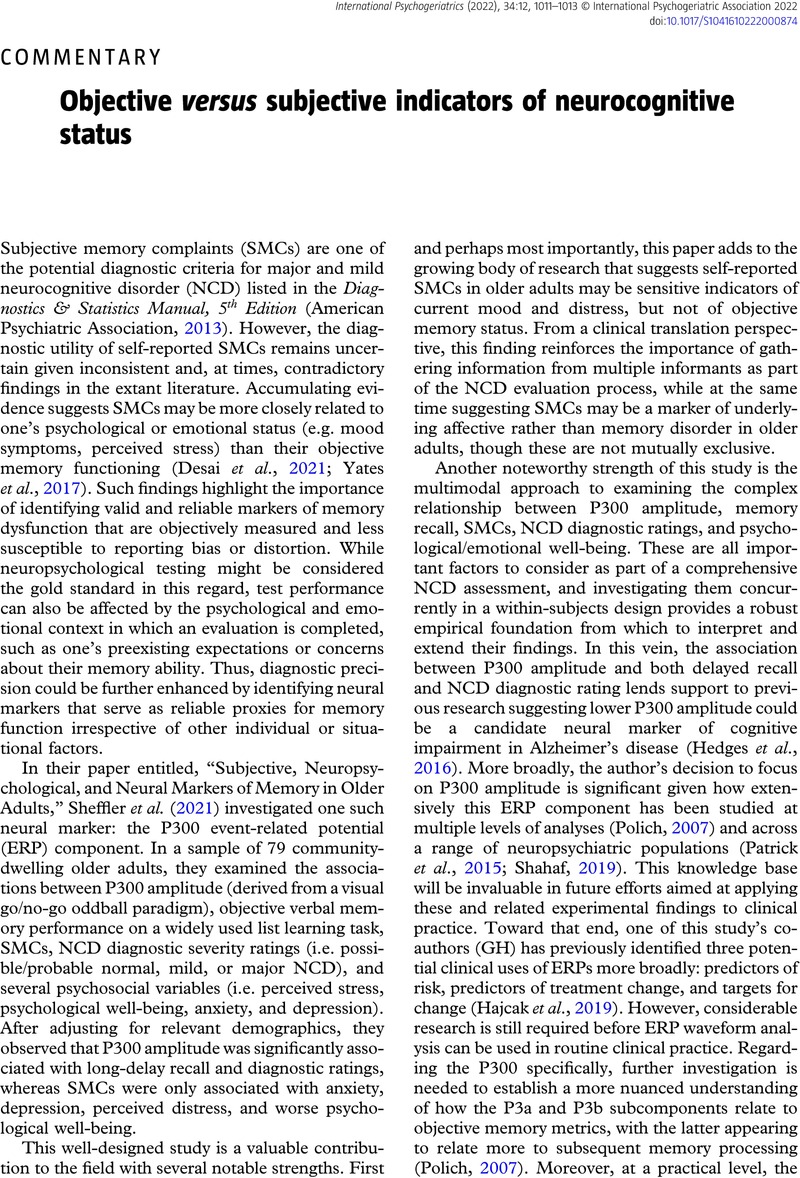No CrossRef data available.
Article contents
Objective versus subjective indicators of neurocognitive status
Published online by Cambridge University Press: 04 October 2022
Abstract
An abstract is not available for this content so a preview has been provided. Please use the Get access link above for information on how to access this content.

Information
- Type
- Commentary
- Information
- International Psychogeriatrics , Volume 34 , Special Issue 12: Issue Theme: Subjective Cognitive Complaints: What Do They Predict? , December 2022 , pp. 1011 - 1013
- Copyright
- © International Psychogeriatric Association 2022
References
American Psychiatric Association. (2013). Diagnostic and Statistical Manual of Mental Disorders (5th ed.). Available at: https://doi-org.ezproxy.frederick.edu/10.1176/appi.books.9780890425596
Google Scholar
Babulal, G. M. et al. (2019). Perspectives on ethnic and racial disparities in Alzheimer’s disease and related dementias: update and areas of immediate need. Alzheimer’s & Dementia, 15, 292–312. https://doi.org/10.1016/j.jalz.2018.09.009
CrossRefGoogle ScholarPubMed
Campanella, S. (2013). Why it is time to develop the use of cognitive event-related potentials in the treatment of psychiatric diseases. Neuropsychiatric Disease and Treatment, 9, 1835–1845. https://doi.org/10.2147/ndt.s53687
CrossRefGoogle ScholarPubMed
Desai, R. et al. (2021). Affective symptoms and risk of progression to mild cognitive impairment or dementia in subjective cognitive decline: a systematic review and meta-analysis. Ageing Research Reviews, 71, 101419. https://doi.org/10.1016/j.arr.2021.101419
CrossRefGoogle ScholarPubMed
Hajcak, G., Klawohn, J. and Meyer, A. (2019). The utility of event-related potentials in clinical psychology. Annual Review of Clinical Psychology, 15, 71–95. https://doi.org/10.1146/annurev-clinpsy-050718-095457
CrossRefGoogle ScholarPubMed
Hedges, D., Janis, R., Mickelson, S., Keith, C., Bennett, D. and Brown, B. L. (2016). P300 amplitude in Alzheimer’s disease: a meta-analysis and meta-regression. Clinical EEG and Neuroscience, 47, 48–55. https://doi.org/10.1177/1550059414550567
CrossRefGoogle ScholarPubMed
Jang, Y., Haley, W. E., Choi, E. Y. and Franco, Y. (2022). Racial/ethnic differences in correspondence between subjective cognitive ratings and cognitive impairment. American Journal of Geriatric Psychiatry, 30, 627–635. https://doi.org/10.1016/j.jagp.2021.10.015
CrossRefGoogle ScholarPubMed
Nielsen, T. R. and Jørgensen, K. (2020). Cross-cultural dementia screening using the Rowland Universal Dementia Assessment Scale: a systematic review and meta-analysis. International Psychogeriatrics, 32, 1031–1044. https://doi.org/10.1017/S1041610220000344
CrossRefGoogle ScholarPubMed
Patrick, R. E., Kiang, M. and Christensen, B. K. (2015). Neurophysiological correlates of emotional directed-forgetting in persons with schizophrenia: an event-related brain potential study. International Journal of Psychophysiology, 98, 612–623. https://doi.org/10.1016/j.ijpsycho.2015.01.006
CrossRefGoogle ScholarPubMed
Polich, J. (2007). Updating P300: an integrative theory of P3a and P3b. Clinical Neurophysiology, 118, 2128–2148. https://doi.org/10.1016/j.clinph.2007.04.019
CrossRefGoogle ScholarPubMed
Shahaf, G. (2019). Neuropsychiatric disorders as erratic attention regulation-lessons from electrophysiology. Psychiatric Quarterly, 90, 793–801. https://doi.org/10.1007/s11126-019-09664-x
CrossRefGoogle Scholar
Sheffler, J. L., Meynadasy, M. A., Taylor, D. T., Kiosses, D. N. and Hajcak, G. (2021). Subjective, neuropsychological, and neural markers of memory in older adults. International Psychogeriatrics, 1–9. https://doi.org/10.1017/S1041610221002623
CrossRefGoogle ScholarPubMed
Teresi, J. et al. (2020). Evaluation of the measurement properties of the Perceived Stress Scale (PSS) in Hispanic caregivers to patients with Alzheimer’s disease and related disorders. International Psychogeriatrics, 32, 1073–1084. https://doi.org/10.1017/s1041610220000502
CrossRefGoogle ScholarPubMed
Yates, J. A., Clare, L., Woods, R. T. and MRC CFAS (2017). Subjective memory complaints, mood and MCI: a follow-up study. Aging & Mental Health, 21, 313–321. https://doi.org/10.1080/13607863.2015.1081150
CrossRefGoogle ScholarPubMed

